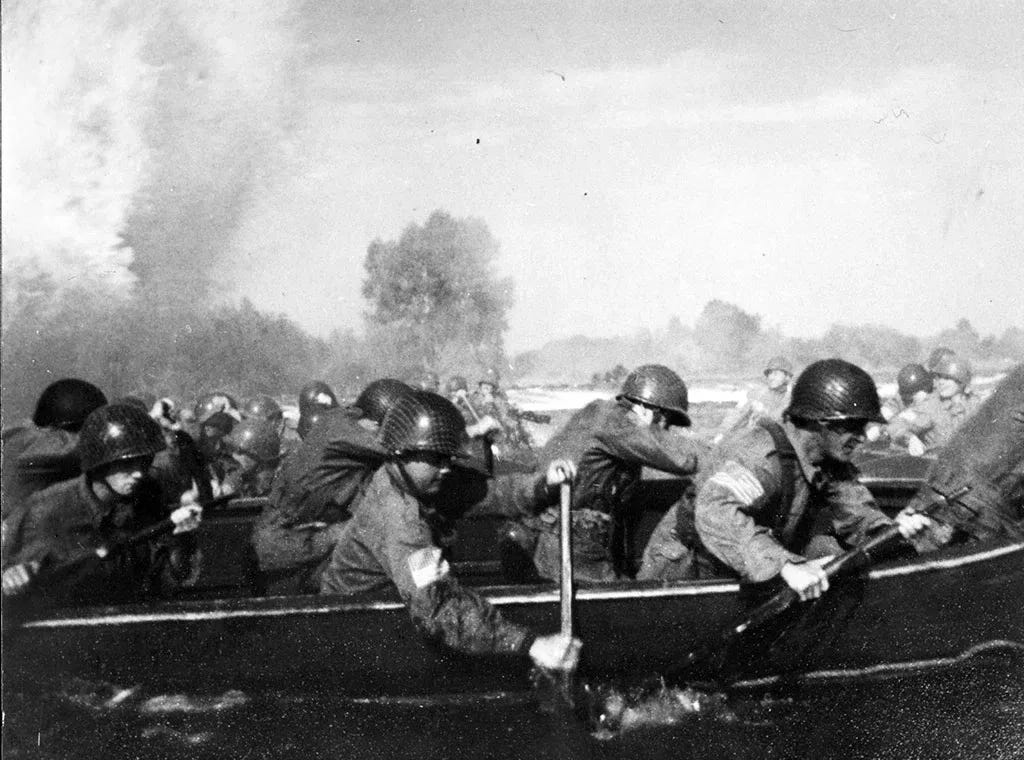The Shrinking Perimeter
An excerpt from Air War Market Garden, a four volume history based on a diverse range of first-person accounts
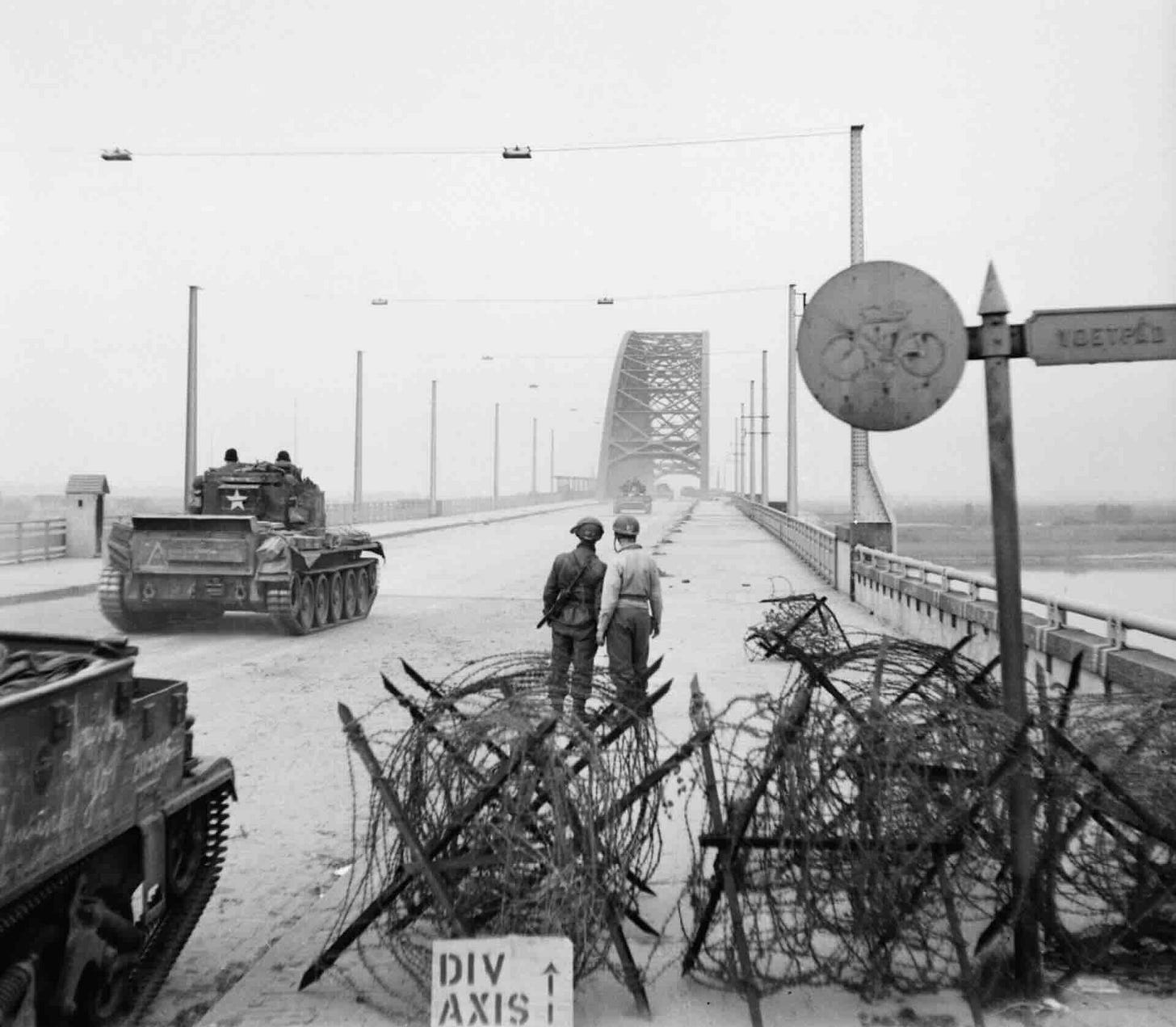
Martin W. Bowman is an extraordinarily prolific author, specialising in aviation. Most of his over 150 titles relate to aspects of military flying in World War II, based on a huge range of personal accounts. For his Air War Market Garden series, he has not restricted himself strictly to an aviation perspective. He has built a unique history using a diverse range of perspectives from all nationalities involved, a composite view of the battle as it unfolded day by day.
The following excerpt from Air War Market Garden: The Shrinking Perimeter (volume 3), covers just part of the action on 22nd September 1944:
Bad weather grounded all except three essential Bluestocking reconnaissance missions by American crewed Mosquitoes over the Arnhem Bridge, one of which was flown by Lieutenant ‘Paddy’ Walker and his navigator, Roy Conyers. As they flew over the north end of the bridge just below the fog, at less than 500 feet, ‘Paddy’ Walker and Roy Conyers could see Germans running for their anti-aircraft guns.
‘Ground fire began almost immediately’ Walker remembers. ‘This continued as we flew over and past the other end, on towards the coast. Tracer fire could be seen coming up around us and the plane was hit. I saw the left wing drop tank disintegrate and jettisoned both. The right engine was shut down and the propeller feathered. The fire went out, but the engine was inoperative. I was flying as low and as fast as possible to get out of range. As we crossed the coast additional fire was received; spurts of water coming up near the plane from the barrage; however, we were not hit. After we got out of range, I climbed up into the weather to gain enough altitude to make an emergency Mayday radio call, to get a ‘steer’ to the nearest base where the weather was suitable to land. We steered to Bournemouth. My Mayday call was answered by the sweetest girl’s British accent - ‘Tommy’ Settle, a beautiful blonde WAAF at Tangmere. During the days that it took to repair the plane she and I became better acquainted.’
… we are now merely a collection of individuals holding on. Make clear to them that we’re terribly short of men, ammunition, food and medical supplies…
In Holland the beleaguered men in the perimeter at Oosterbeek already knew that the Germans had overrun the defences at the Arnhem Bridge and could concentrate all their available forces against them. At dawn Urquhart had received a reply from XXX Corps’ Headquarters: ‘43 Division ordered to take all risks to affect relief to-day and are directed on ferry. If situation warrants you should withdraw on or across ferry.’
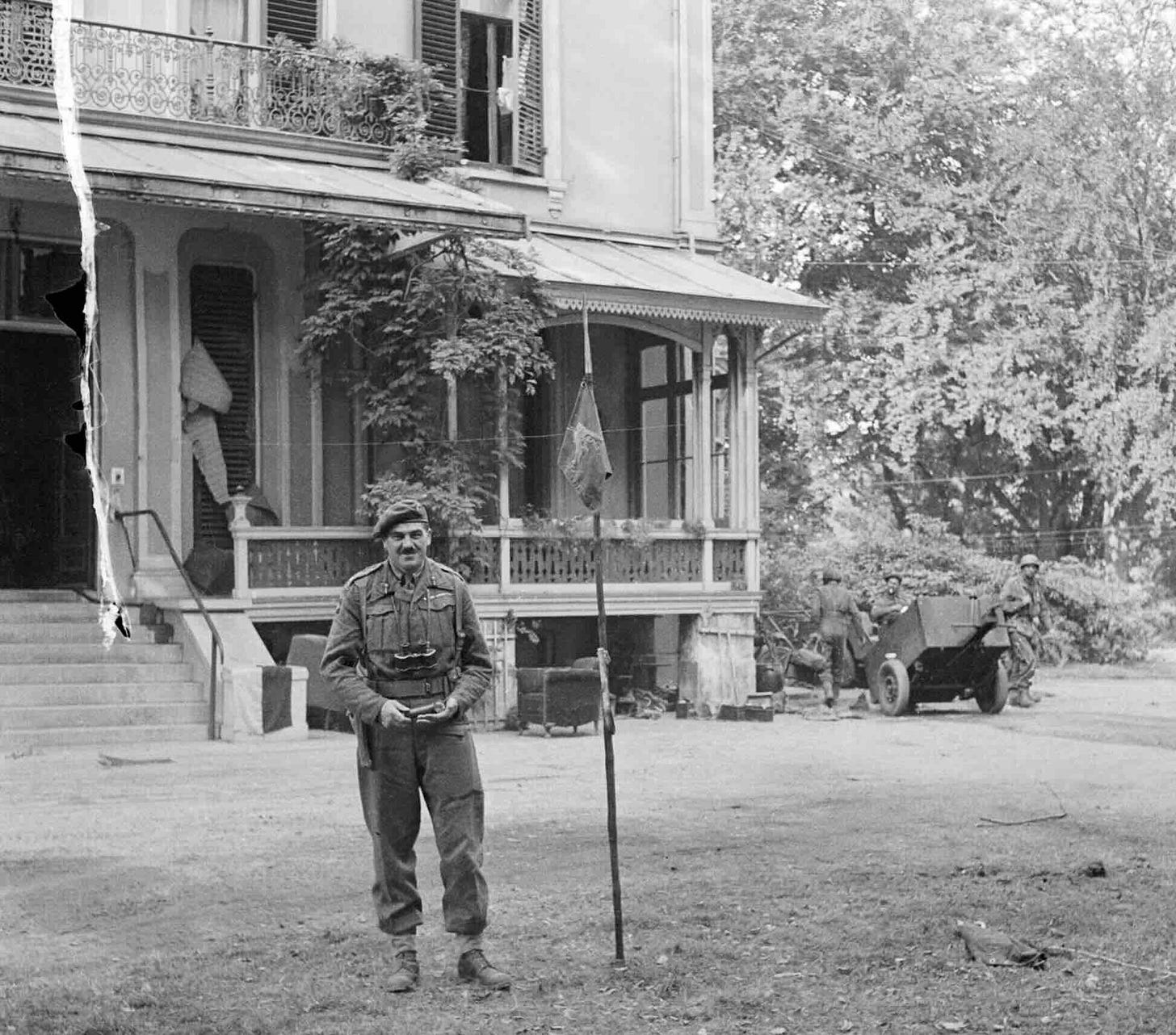
Despite the tone of this signal Urquhart did not feel that XXX Corps were fully aware of his predicament or that ‘all risks’ were being taken to relieve him and so, by noon Urquhart considered it essential to send two officers across the Neder Rjin to acquaint Browning with his situation.
He chose Lieutenant Colonel Charles B. Mackenzie, his GSO1 for the dangerous crossing of the Rhine. Urquhart told him that he wanted him to make their situation unmistakably known and also to find out all he could about the efforts and whereabouts of the relief force. ‘It’s absolutely vital that Browning and Horrocks should know that the Division no longer exists as such’ he told Mackenzie ‘and that we are now merely a collection of individuals holding on. Make clear to them that we’re terribly short of men, ammunition, food and medical supplies and that we need some DUKWs to ferry the Poles across. If supplies don’t arrive tonight it may be too late.’
Urquhart knew that the ferrying arrangements would soon need priority and their specialist nature suggested that it would be useful also for MacKenzie to take Lieutenant Colonel ‘Eddie’ Myers who was commanding the Royal Engineers, a most able engineer. Myers had already studied the problem of ferrying the Poles across the river and could give XXX Corps an accurate estimate of what craft and equipment were required. Urquhart asked them also to try and have a look at the river banks in order to give the advancing elements of the 43rd Division some reliable picture of crossing possibilities. He wished them luck and called: ‘Above all, do try and made them realize over there what a fix we’re in.’
The enemy renewed its attacks at 0900 on the morning of Friday the 22nd. At about that time the 1st Battalion The Border Regiment ammunition dump received a direct hit, which caused considerable damage in the area and destroyed all but two of the remaining serviceable battalion vehicles. The explosion caused a fire, which set ammunition exploding in all directions, yet 34-year old RSM Albert ‘Bish’ Pope who had served with the Regiment since 1927 and CSM Les Fielding and a party of men managed to salvage mortar bombs and .303 inch ammunition before the fire reached the plastic high explosive.
Everyone reached cover before this went up with a deafening roar, the loudest, said Les Fielding that he had ever heard. Trees within a radius of hundreds of yards were stripped of leaves and small branches. The fire caused by the explosion became the registration point for the enemy mortars, so any movement from the slit trenches would result in casualties and RSM Pope was fatally wounded. He was taken to the Regimental Aid Post, where, even as he lay dying, he joked with a Medical Orderly about getting his hair cut. He died shortly after, a much respected and well-loved father-figure.
Staff Sergeant Bert Harget and others were all standing in the small courtyard at the rear of the house in a forward area, discussing the move back to Division HQ, when a mortar bomb came over the roof and exploded right among them. ‘Of the eight men who were there I was the only one not hit by shrapnel’ says Harget. ‘I managed to get stretcher bearers to the others and few days it was back to the perimeter defence, moving back continuously and digging in. I had no food of my own, only what I could scrounge from the houses.’
Inside the perimeter the enemy shelling and mortaring was causing more casualties. ‘The perimeter was now subject to intense mortar fire and snipers were inflicting heavy casualties’ recalled Fred Moore. ‘We remained in a defensive position during the morning, but with a lull in the intensity during the early afternoon, a small detachment of us were sent out on a scouting mission. We searched a group of houses and noted the total devastation around us, with bodies and debris from previous battles lying everywhere. There were still a number of Dutch civilians occupying buildings, mostly living in the cellars. Without warning we were subjected to a barrage of shellfire. A soldier near to me dropped and although he was dead, there was no sign of an injury, so we presumed that he had been killed by the blast. Having established that the area at that time was clear of enemy, we returned to our lines to report. The Germans seems to have a strange reluctance to fight during the hours of darkness, so as the light began to fade our hopes of surviving to another day and maybe rescue by the British Army, were rekindled.’
Sapper Philip Andrew Hyatt of No.3 Troop, 4th Parachute Squadron broke up a strong attack on the 4th Parachute Squadron RE defensive position. The enemy advanced to within 50 yards of the position under heavy small arms fire. Hyatt jumped out of his slit trench and ran towards the enemy throwing hand grenades, killing three or four Germans. The enemy attack was checked. Hyatt continued to throw grenades until they withdrew. He was recommended for an immediate award of the Military Medal.
Major Alan Bush second in command of the 3rd Parachute Battalion, who had been wounded during the fighting in the outskirts of Arnhem, had now rejoined the remnants of his battalion in their new positions. Bush broke out of captivity to rejoin and then command a section of the perimeter. This, though again wounded, he held till the order to withdraw came. ‘I took command of the remnants of the 1st and 3rd Battalions’ recalls Bush. ‘We were in what seemed to be a bare market garden surrounded by houses on three sides. We knew that this had to be the last stand; there was nowhere else to go. Enemy attempts to penetrate this area were frequent, but fortunately predictable - every 4 hours from dawn to dusk; no serious night attacks were tried. Tanks and infantry following a mortar strike was the pattern. During these five days I worked closely with Robert Cain of the South Staffords. We had no communication with Division HQ until word reached us by runner in the early evening of Monday 25th that we were to withdraw at midnight; and not before time as we had little ammunition left.’
At the Mill Hill Fathers’ House [ a Catholic Missionary residence] there were two English soldiers hiding behind the Rhododendrons in front of the villa. ‘They were calling out to Wenceslaus who was milking the cows’ wrote Father Bruggeman. ‘They asked for food and we gave them milk and tins from the sisters basement. The two boys who had been here since Monday left to try to get back to Oosterbeek where they lived. That leaves us with ten refugees. The whole Albers family is with us as well. Father van Laar went walking in the woods behind the garden and was stopped by a German soldier with two English prisoners. His collar saved him; without that he would have been taken too. The two prisoners were badly wounded and could hardly walk. At the Sisters’ they were allowed to rest and eat something. Mother Immaculata [an English nun], with tears in her eyes, saw her countrymen but wasn’t allowed to help. After 15 minutes they went on all the way to Arnhem.
‘On Friday Father Claver and Odulph had to bury bodies. They came back as sad as they went because there weren’t any food baskets anymore. The supplies from the sky always came after 1600. This time a heavy German car came with an anti-aircraft gun and parked it next to the chapel. The Friday service had just started and we tried to sing louder than the gun, but that didn’t work, so Father Gijsman was wise enough to stop the service. As soon as we came out of the chapel we had to run for shelter.
Above Oosterbeek I saw burning planes going down. One of them came very low over the house. A drunken ‘Mof’ [akin to ‘Boche’ or ‘Kraut’] fired a couple of bullets in the sky. Several parachutes with supplies came down, but all in the hands of the Germans. We didn’t try to get any this time because there were too many Germans and nobody wanted, just like Father Thijssen yesterday, to get smacked in the face. Around supper some Germans came and stole our best blankets from the beds. It didn’t help to protest. Later they came back for more, but by that time we had hidden the best that remained. Nobody knows what the situation is, but now, even the optimists, are convinced that the airlanding wasn’t as successful as we hoped.
‘Next morning after breakfast a couple of Germans came and demanded meat. Talking didn’t work and they went outside and shot two calves. They dragged the calves to the car and drove off. All we could do was watch and be quiet, or we could have had a bullet too. Throughout the whole morning the Amsterdamsestraatweg was full of people running in the direction of Ede. The village of Huissen was evacuated.
Later in the afternoon the elderly came, about 20 to the Lichtenbeek. They were accompanied by several nurses. They came from Oosterbeek and had to run when shells hit their homes several days ago. They had been running ever since and their last days were spent in ‘La Cabine’ of the water company on the Amsterdamsestraatweg. Although Father Wieschermann looked to taking more people in, we made the best of it and made the bicycle shed into a place to sleep. We covered the floor with straw and blankets and made some toilets. This was the first day of the air landing without supplies from above.’ There were still some Dutch civilians sheltering in their houses. One of these families, Evert and Bertha Breman and their two daughters, stayed in their house, 117 Benedendorpsweg, just east of the church.
Corporal Danny Morgans and his section of 1st Battalion were dug-in in their garden. ‘After leaving the church we moved out to our new positions. Our ‘platoon’ was in the gardens of houses on the Benedendorpsweg, facing north with the ground rising to our front. We literally had to wreck a beautiful house. First the windows had to be smashed, so the glass couldn't be blown in on us. Then the furniture was piled into barricades inside the room. Everything that was as the Germans were using incendiary ammunition to burn us out. Very soon the place was an organised shambles. Suddenly the old gentleman who owned the place appeared in his wrecked lounge. He was carrying a tray with glasses and a bottle of Advocaat. He solemnly filled up the glasses and handed them round to the men who'd just wrecked his home. I apologised for what we had done and he replied, ‘It is not you, my son, it is the war.’ And he returned to his cellar.
‘We had a Polish anti-tank gun with us and it knocked out a tank as it topped the rise. There was much probing by tanks, but the infantry became shy; they just stood off and plastered us with mortar and shell fire, but the line held to the end. Food had long run out and the only water was from a pump in the yard of the Breman family. We shared what little food they had and despite the heavy shelling and constant attacks they looked after our wounded and helped us. The family will never be forgotten by our motley crew, who shared their house during this battle. In addition, they had already put their lives at risk by hiding a Jewish refugee. He withdrew across the river with our battalion survivors.’
What remained of the Division still held approximately to the perimeter that had been established. The water scarcity was a severe handicap and the younger soldiers especially were feeling the effects of hunger. One ration distribution on Thursday night had been ‘one sardine and some biscuits per man’. Even the war correspondents did all they could to help. From the bottom of a slit trench writing was not easy. Later, Stanley Maxted, a Canadian working for the BBC and Alan Wood, who covered Arnhem for the Daily Express and had also worked in New Guinea and China, produced excellent reports on the battle.
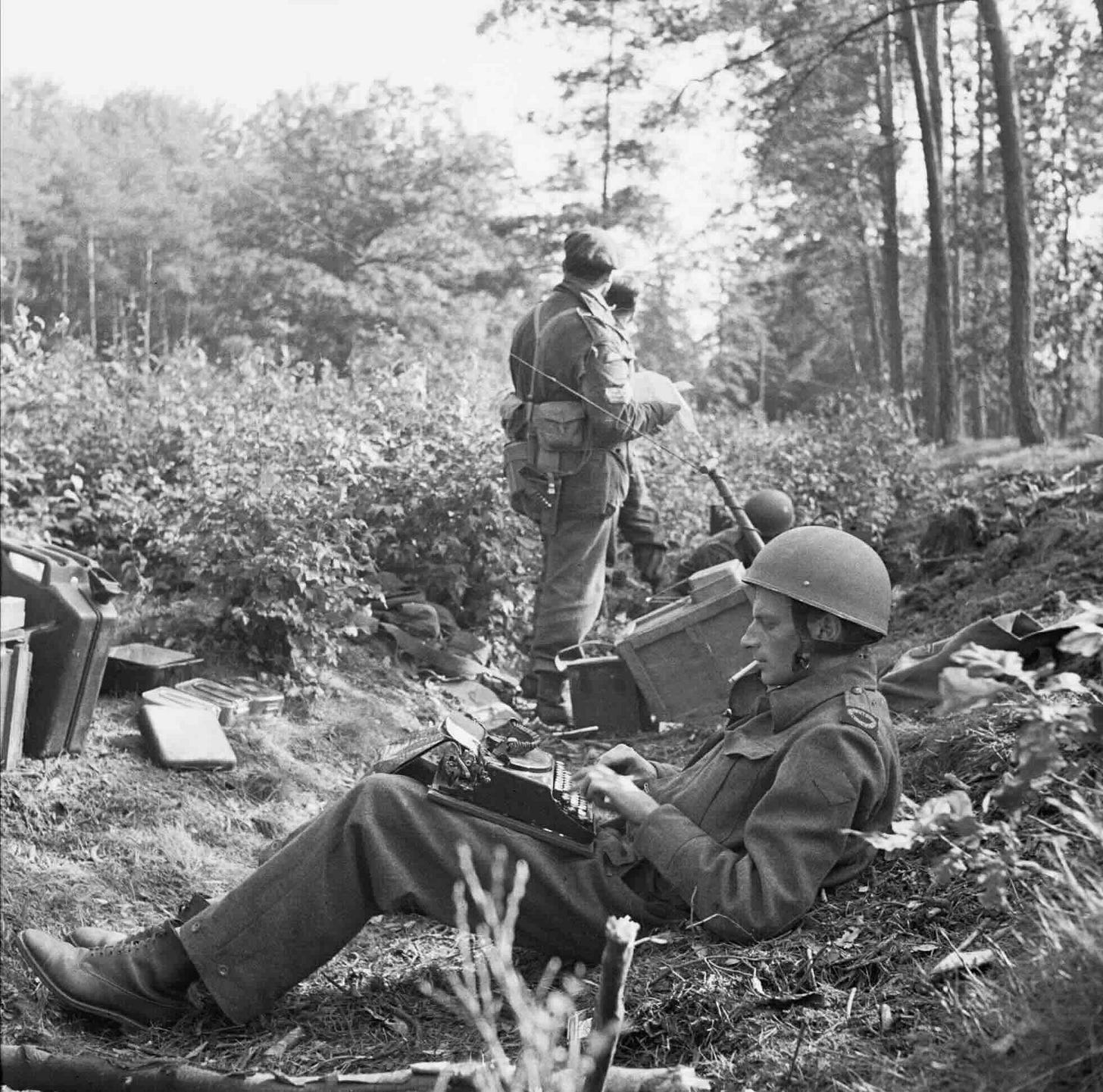
Wood was among those trapped in the shrinking perimeter: ‘It has been a nasty morning - cold and misty - and the Germans are plastering us plentifully with mortars, big guns and 88s. The 88s are worst because you do not hear them coming. Machine guns have just opened up on the right. In this patch of hell our men are holding a few houses that still stand. An old lady in black stumbled out of one of them a few minutes ago and a British soldier ran out and put his arm round her. She collapsed and he carried her down to safety in a cellar. It is now just five days and five nights since we flew out from England. God knows from what secret source of strength these fighting men have drawn the guts which have kept them going.’
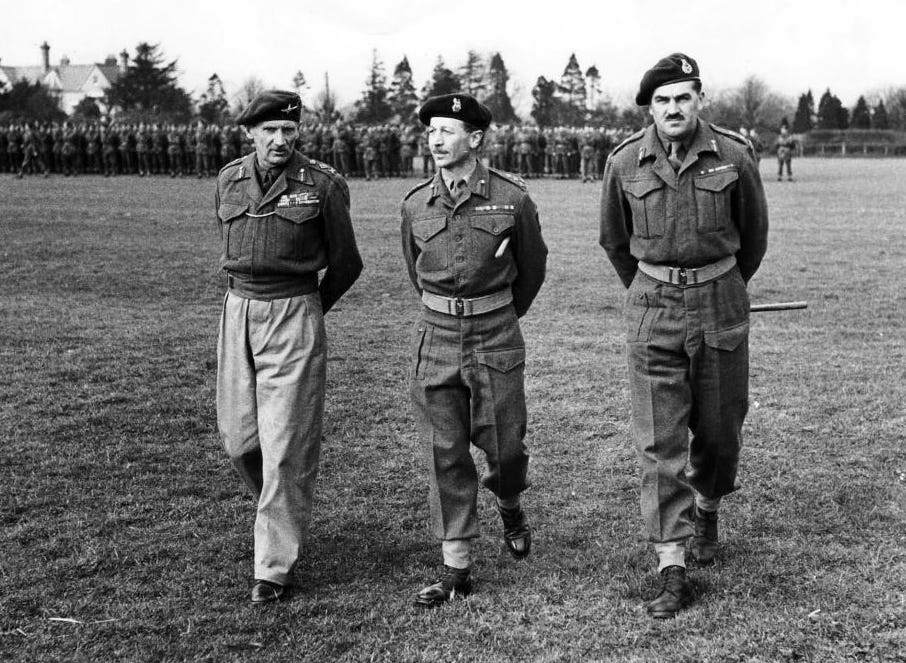
Despite the mortaring and the sickening stench that pervaded the area it was the wounded who were suffering most. ‘Shan’ Hackett, on the way back to his command post after arranging for the arrival of the Poles, was caught by a mortar burst and hit in the thigh and stomach. A Recce Squadron man accompanying him was also hit.
When Hackett found that the man’s leg was broken and that his own was only bleeding he made his way to the Hartenstein and collected two stretcher-bearers. He led them to the place where the man lay and then sought attention for himself. Graeme Warrack, who was at Divisional HQ to give Urquhart the medical picture and twice had to take cover, went off to see Hackett who was always trying to persuade Warrack to open the brandy which he knew doctors carried; yet even on such occasions as St. Andrew’s night and on the ship coming home from Italy Warrack had made unsatisfactory excuses.
Now Hackett said to Warrack: ‘You can now produce those medical comforts.’ Warrack was apologetic. ‘The brandy has run out,’ he said. ‘And this,’ retorted Hackett, ‘is the moment we’ve waited eighteen months for!’ Warrack gave him a short of morphia.
‘We always say a head wound or a stomach wound, euthanasia’s best’.’
Hackett was carried with four other wounded, two of them stretcher cases lying across the bonnet, in a jeep through some shelling to the St. Elizabeth Hospital. Hackett was heartened by the evidence he saw all around of the work of the 2nd Army medium guns. He was feeling very sick by the time he was delivered on to the stone floor of the hospital. Nearby lay his sergeant clerk, Dudley Pearson.
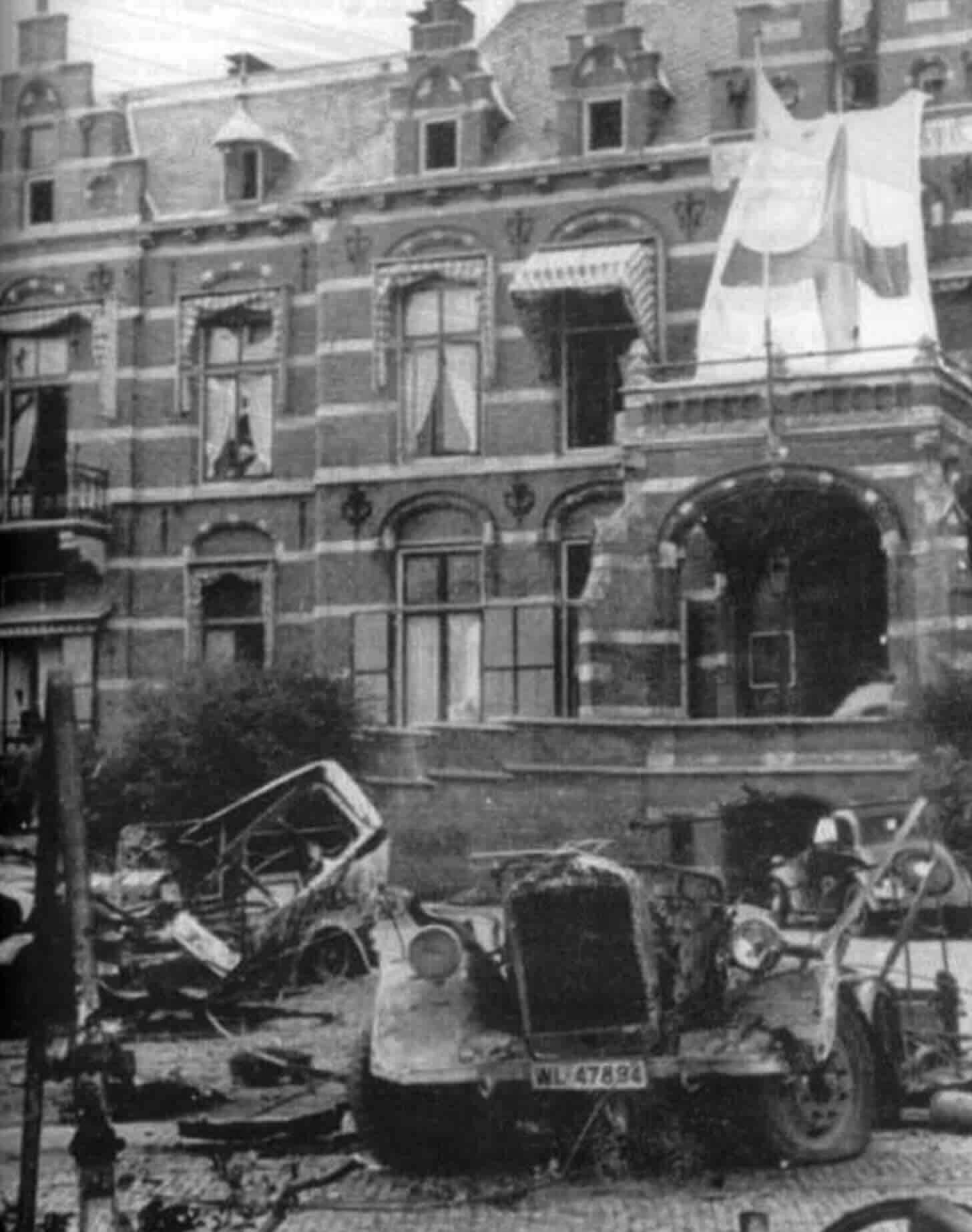
The German had already seen several extreme cases and he was pronouncing a verdict on each. Of Hackett he remarked: ‘We always say a head wound or a stomach wound, euthanasia’s best’.’ As casually as he could, Lipmann-Kessel said, ‘Oh, I don’t know. I think I’ll have a go at this one.’ Hackett was wearing no badges of rank. ‘You’re wasting your time,’ the German said.
Lipmann-Kessel operated; splitting his patient from breastbone to navel, removing the splinter and for three hours repaired the dozen holes in his lower intestine. His superb surgery managed to save the brigadier’s life. Hackett did not doubt for one minute that he would get well, he later wrote. ‘I took it completely for granted that I would get out as soon as it was possible.’
© Martin W. Bowman 2013, 'Air War Market Garden: The Shrinking Perimeter (volume 3)'. Reproduced courtesy of Pen & Sword Publishers Ltd
Affiliate Links
Recently on World War II Today ...
The 82nd Airborne across the Waal
The automatic and flat trajectory fire had increased and the artillery was deadly. Men were falling right and left. In everyone’s ears was the constant roar of bursting artillery shells, the dull wham of a 20-mm, or the disconcerting ping of rifle bullets.




